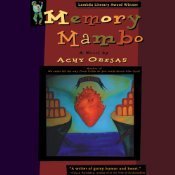I tried to like this book, but it never happened for me. I've read some other reviews, and it isn't that I disagree with their sentiments, I just don't extend them quite so far. I felt the writing very heavy handed (which I almost feel bad saying, the author is so respected). I'd like to cite the point where Nena and Juani are talking in Nena's place in Miami about memory:
"Nena, everybody in our family's a liar...I mean how do you wander through it all? How do you tell Bernie about our family? What do you say?"
"Well, I just tell Bernie what's true for me, and I let him know I have doubts, and that there are varying stories," Nena said. "For example, if I were gonna tell hi about Titi and Patricia, I'd tell him Manolito's story adn then maybe your story and then my story--what I believe--and by the end, there's a new story--Bernie's."
I shook my head. "Very relative," I said. "It must take forever to tell all the stories."
"Hey, we're into communicating, okay?" she said with a chuckle. "It's sort of like singing 'Guantanamera'--everyone gets a chance to make up their own verse."
"Memory mambo," I said, one hand in the air, the other on my waist as if I were dancing, "one step forward, two steps back--unnngh!"
Unnngh is right. I read this and in spite of myself cringed. It was not a moment of incredible clarity for me, when everything I'd read in the book snapped into place, the theme became clear, and the title tied into it. Maybe it could have been, but the theme of memory, what is real, what is pretend, whether it matters, and if we can all have our own, true, and different story had been been beat into my head by the time I got to this part in the book. I had similar issues with the writing throughout the book--it just felt so, so incredibly forced, especially the dialogue. People said things that, the way they were written, seemed incredibly unlikely to actually be said, but yet inevitable that the author was going to have them say it. Also, I felt like the treatment of men in this book was a little biased. I absolutely hated Jimmy from the moment he was introduced, and I thought he was a rather flat character. He is destined to commit a horrible act, and the reader knows it the whole story, so when it happens it isn't as surprising or impacting as it could have been. All of the men are rather one dimensional: drunk, unemployed, close minded, obsessed with their sexuality and manliness, womanizers, and willing to abandon their families in pursuit of a lark.
This being said, I do think there were some great, great aspects to this book. I found the portrayal of abuse within a lesbian relationship incredibly moving and beautifully written, in spite of its innate ugliness. The plot of this book was great, and at times the writing really helped that plot and fleshed it out like it should, and at other times the writing, for me, really detracted from the characters and the plot. I also liked the avoidance of traditional butch/femme stereotypes. I thought the ideas created by the inspection of the difference among the Cubans in exile, the description of the uncle's artwork, the description of the academic, hippie-dippy friends of Gina who were all pro-independence for Puerto Rico, and many other things were creatively and skillfully painted.
I did enjoy this book, I guess I just expected more. There were incredible positives, with the discussion of abuse in a lesbian relationship being the most impacting. The author showed courage in writing about such difficult material, charged with race and sexuality issues, but I would have liked this book so much more if it was just a little less heavy handed and respected the reader a little more.

